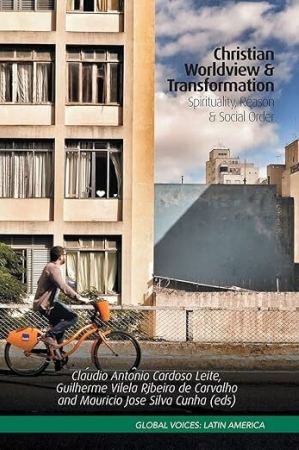
A German theologian (from a Pietist tradition) once asked where I found a theology of ‘transformation’ in the Bible. I wish I’d had this book to-hand at that point.
Part of Regnum’s ‘Global Voices: Latin America’ series, it’s a tightly argued series of essays that examine the interplay between the long-accepted concept of ‘worldview’ and transformation. Its theological perspectives point out that ‘Jesus always lived on the edge of the empire,’ ‘The gospel concerns nothing less than all things (Col. 1/16-20) and the church’s mission concerns nothing less than all things.’
The Early Church and the Reformation were eras ‘when Christianity really made a difference,’ with ‘the destruction of the hierarchical pyramid of power’ and whole communities transformed.
They apply rich lessons from various stages in history. But while they’re critical of much of contemporary evangelicalism, they’re not blind to the mistakes of past heroes of the faith either. For example, while praising Abraham Kuyper, ‘it is important to… discern in the light of the Scriptures what Kuyper got right and where he was wrong.’
The Christian Daily International (CDI) team hopes to see Jesus’ followers integrating faith into every aspect of God’s created world. These Brazilian authors analyse why that hasn’t happened in Brazil, despite dramatic evangelical growth. Arguing for an integrated Christian worldview, they identify biblical truths that were present in historical examples when society has been transformed by the gospel:
‘The more a society has impregnated itself with beliefs based on principles contrary to the Word of God, the more it will be in darkness, with visible consequences in the form of spiritual and physical poverty, injustice, deprivation, hunger, discrimination, despair, oppression, pain and death’ (p.35).
‘If the church does not disciple society, it will be discipled by society,’ and ‘we must return to the sources of our evangelical faith to rediscover who we are’ (p. 15).
They argue for a biblical intellectual framework in all the Bible’s practical application. For example, they write, ‘There is an urgent need for consensus among the evangelical community in Brazil over the formulation of a Christian social theory.’ The final chapter lays an intellectual and biblical foundation for collaboration with others (another of our passions in CDI).
The book finishes with ‘the challenge of constructing a theory and practice contextualised to the 21st century Brazilian reality but based on timeless and supra-cultural truths – and therefore perfectly applicable in our context.’
The authors criticisms and questions are surely relevant for Christian audiences in other parts of the Global South and in the Global North, too. They call the Church to be the Church, as agents of the ‘transforming gospel …. already invented by God,’ ‘manifesting the biblical ground-motif of creation-fall-redemption in all its transforming potential’.
Christian Worldview & Transformation: Spirituality, Reason & Social Order. Claudio Antonio Cardoso Leite, Guilherme Vileja Ribeiro de Carvalho and Mauricio Jose Silva Cunha. Regnum Books International. Originally published as Cosmovisao Crista e Transformacao, Paperback ISBN: 978-1-913363-13-0





